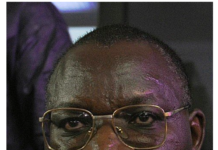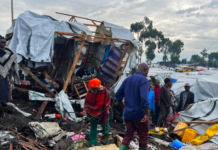On May 22, 2024, Kenyan President William Ruto commented on the M23 issue, emphasizing that it is a matter between the Kinshasa government and its citizens, rather than a conflict involving Rwanda and the DRC. He suggested that the problem could only be resolved through dialogue.
During an interview with Jeune Afrique in Kigali, at the Africa CEO Forum last weekend, Ruto was asked about the tensions between Presidents Tshisekedi and Kagame and the potential impact on East African regional stability. Ruto highlighted Kenya’s involvement in the peacekeeping efforts in DRC, with Kenyan troops part of the regional forces tasked with restoring peace. He noted that the M23 had been asked to disarm and enter temporary camps before reintegration, a step that has not been achieved so far.
Ruto stated, “M23 agreed to withdraw from the territories it had taken. M23 asked, ‘Should we enter camps and disarm before talks? Or should we talk first and then enter the camps, knowing the terms? Should we put our demands on the table?’ And that made sense to all of us.” He urged the Kinshasa government to engage in dialogue with its citizens to solve the problem.
UN experts have presented evidence that Rwandan forces support M23, while Congolese forces collaborate with FDLR rebels, allegations denied by both Kinshasa and Kigali. Kinshasa claims that Rwanda is backing M23, which now controls significant portions of North Kivu province. Despite the denial of negotiations with M23 by the Kinshasa government, some officials have increasingly indicated that military force is the only remaining solution, especially with the support of SADC forces and other armed groups.
Ruto expressed that the conflict in eastern Congo cannot be resolved militarily, particularly when some parties are willing to negotiate. “That is why we asked the DRC government to seriously consider using the available peace pathways—be it the Nairobi process or the Luanda peace initiative—or a combination of both,” he said.
Earlier this month, SADC, which has deployed troops in DRC since December 2023, announced it would launch military operations to eliminate M23. Last week, DRC government spokesperson Patrick Muyaya told Radio Okapi that “all countries in the world want us to pursue peace talks like those in Luanda,” while criticizing the lack of action against Rwanda’s alleged support for M23.
Muyaya emphasized the urgency of the situation, mentioning ongoing preparations for military operations between Congolese and SADC forces. This week, heavy fighting was reported in Masisi and Rutshuru territories between government forces and M23, raising questions about whether SADC operations have commenced.
On Wednesday, North Kivu army spokesperson Lt. Col. Guillaume Ndjike Kaiko announced that FARDC launched attacks on M23 positions that morning, claiming government forces now control several areas in Masisi after M23, referred to as Rwandan troops by Ndjike, fled. M23 has yet to comment on these claims.
In this conflict, both FARDC and M23 typically accuse each other of initiating attacks, with neither side often admitting to launching assaults. Ndjike’s statements today could signify the start of the long-anticipated military operations.
In his interview with Jeune Afrique, Ruto said he discussed the situation with SADC leaders when Kenyan troops withdrew from DRC and SADC forces entered. “I told them openly that we see no military solution here,” he said. Analysts believe that Kenyan troops were asked to leave DRC by the Congolese government due to perceived partiality towards Rwanda and M23, drawing parallels to the controversial role of UNAMIR troops in Rwanda in the early 1990s.
These comments reinforce the perception among many observers that Kenyan troops in DRC favored Rwanda and M23. The official formation of the “Alliance Fleuve Congo” in December 2023 in Nairobi by Corneille Nangaa, former chairman of the Congolese Electoral Commission, and his open alliance with rebel movements, including M23, has exacerbated this perception. The tolerated presence of Congolese rebels in Kenya has caused confusion and anger among many Congolese, with President Ruto being declared an enemy of the Congolese people on social media.
Ruto explained, “Gradually, after many months, they now agree with us that we need to rethink [whether] to send more troops or engage more in dialogue, as these [M23] are citizens wanting and ready to talk to their government. If you ask me, I would repeat: ‘Let’s stop escalating this issue. It’s not a Rwanda-DRC problem; it’s not between Kagame and Tshisekedi, it’s between citizens and their government. If we understand it that way, it will be solved quickly.’”
“How can it be a Kagame issue if these are Congolese?” Ruto questioned, aligning his interpretation with Rwanda’s stance that the M23 issue is an internal Congolese affair. Ruto’s statements are likely to be poorly received in Kinshasa, where officials have accused him of siding with Rwanda in the eastern DRC conflict.
Ruto asserts that his perspective is not unique to Rwanda or President Kagame. “It’s not just Kagame saying this. As heads of state, we asked: Are the M23 members Rwandans or Congolese? And DRC said they are Congolese… So, if they are Congolese, how does it become Rwanda’s problem? How does it become Kagame’s issue?”
Ruto insists that dialogue is the solution, stating, “I see no better answer for citizens with grievances against their government who want to talk to solve their issues. Nothing is lost when you engage with your people.”
M23 demands that the DRC government address the issue of Congolese refugees, mostly Tutsis, in neighboring countries, stop violence against Congolese Tutsis, and end ethnic discrimination policies. Some M23 leaders, former DRC soldiers, reportedly seek reintegration into the army and political appointments, but M23 denies these are their main goals.
For Ruto, dialogue is the key to resolving these conflicts: “I don’t see a better solution for citizens with grievances against their government who want to engage to resolve their issues… Nothing is lost when you engage with your people.”
































































